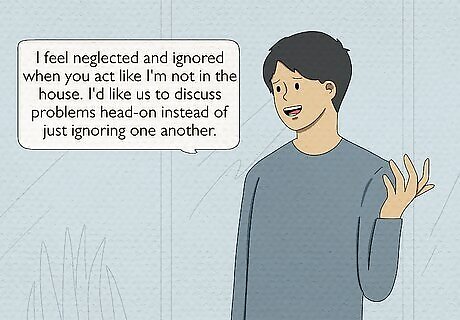
views
Responding Effectively

Spot the behavior when it's happening. Knowing the different “faces” of passive-aggression can help you figure out your mom's behavior and respond accordingly. Most experts agree on a few common ways passive-aggression rears its head: Giving the silent treatment. Procrastinating and sabotaging things by failing to do tasks or reminding you about something at the last minute. Being overly critical or offering masked insults (i.e. a compliment that isn't actually sincere or that precedes a snide comment). Behaving in a sulky manner; refusing to smile even in a cheerful environment.

Remain calm. When dealing with a passive-aggressive, use logic. Never react emotionally. If you show that you are upset or frustrated, your mom might withdraw even further or even add to the existing tension. If you must, take a few minutes away from her to clear your head. Call a friend, walk around the block, or play with your pet. Return in a calm headspace, so you can figure out the best way to move forward.

Ignore the behavior if you can. If your mom fails to get attention for her passive-aggression, she may stop. Try acting indifferent about it and see if it changes. For example, she offers an insincere compliment like, “That sweater is nice, but the one I bought for you is so much nicer.” Don't call her out about it. Instead, coolly respond with “thanks" and keep doing what you were doing. Ignoring probably won't be effective if you are really bothered by the behavior, but it can be helpful for more minor situations like a masked compliment.

Use “I" statements to assertively explain how the behavior affects you. Confront your mother when she's withdrawn and aloof, not when she's overtly angry. For example, when she's engaging in the silent treatment, be upfront and address it using words that don't make her defensive. For instance, you might say, “I feel neglected and ignored when you act like I'm not in the house. I'd like us to discuss problems head-on instead of just ignoring one another.”

Disengage if she escalates the situation. If your mom denies her behavior or becomes overly angry after you confront her, back off. Do so calmly. For instance, if she shouts, “I'm not ignoring you, you're always finding fault with everything I do,” you might simply say “Okay.” Leave the situation and get your own emotions under control before re-attempting the discussion. You may even have to tell yourself, “She's being unreasonable right now and I refuse to participate.”
Communicating with Your Mom

Make talking a part of your normal routine. A major issue with passive-aggressive people is they don't have effective communication techniques, so they bottle things up and feel resentment. By talking more regularly with your mom— about light and serious topics— you can establish healthier patterns of communicating. For example, try asking for her advice on everyday situations, like how to cook something properly.

Practice active listening. Sometimes, passive aggressive people don't feel like they have a voice. Try being extra attentive to your mom when she's talking. Doing so may help her feel more validated and reduce her passive-aggression. When listening, make eye contact, don't interrupt, and try to repeat what she said in a different way afterwards to make sure you understand.

Surprise her and agree. Since your mom has a negative way of communicating with others, she probably expects you to disagree with everything she says. Shake things up and find a way to agree with her. For instance, you might say, “You know, I never thought about it that way.” This doesn't mean you agree with her wholeheartedly, but it validates her feelings a little. Therefore, she'll be more likely to lower her guard when interacting with you. This strategy can be used when your mom is actively engaging in passive-aggressive behavior and when she's not.

Ask open-ended questions. If you're trying to build healthy communication with your mom, don't ask closed-ended questions in which she's able to respond with a “yes” or “no” answer, and ultimately shut down. This also prevents you from feeling like you have to pull teeth in order to get her to talk. For example, instead of saying "Mom, did you like the movie?," say “Mom, what did you think about the movie?”
Caring for Yourself

Get support from your social circle. Your relationship with your mom may not feel very nurturing, so it's important to get social support from others. This may come from your dad, grandparents, aunts and uncles, friends, or other mentors in your community. If you need to talk, reach out to these people to vent about your mom or get practical advice for dealing with her passive-aggressive behavior.

Develop a journaling habit to release your frustration. Become more aware of your own anger that stems from your mother's behavior. Start a daily journal practice of writing down what you're feeling. Periodically re-read your entries to look for recurring patterns and brainstorm solutions. For instance, brainstorming solutions might include noticing that you and your mom usually bump heads whenever you're feeling tired. To fix the problem, keep those interactions short and sweet. Excuse yourself and go to your room rather than trying to reason with her when you're already exhausted. Put your journal in a safe place where your mother can't find it and read it. Some good places might be under your mattress, behind other books in a bookcase, or in your closet.

Perform self-care regularly. Take good care of yourself by doing activities that promote wellness, like eating well and exercising. Also, try mindfulness meditation to learn how to sit with your anger or frustration and keep stress at bay with yoga or deep breathing. You might also do special activities just for you, such as coloring, listening to your favorite music, or cuddling with a special someone.

See a counselor. Work through your thoughts and feelings with a professional. A counselor can help you heal from emotional neglect and even teach useful skills like assertiveness training, so you can better interact with your mother. If you think she's up for it, you might invite your mom to a counseling session at some point, too.




















Comments
0 comment